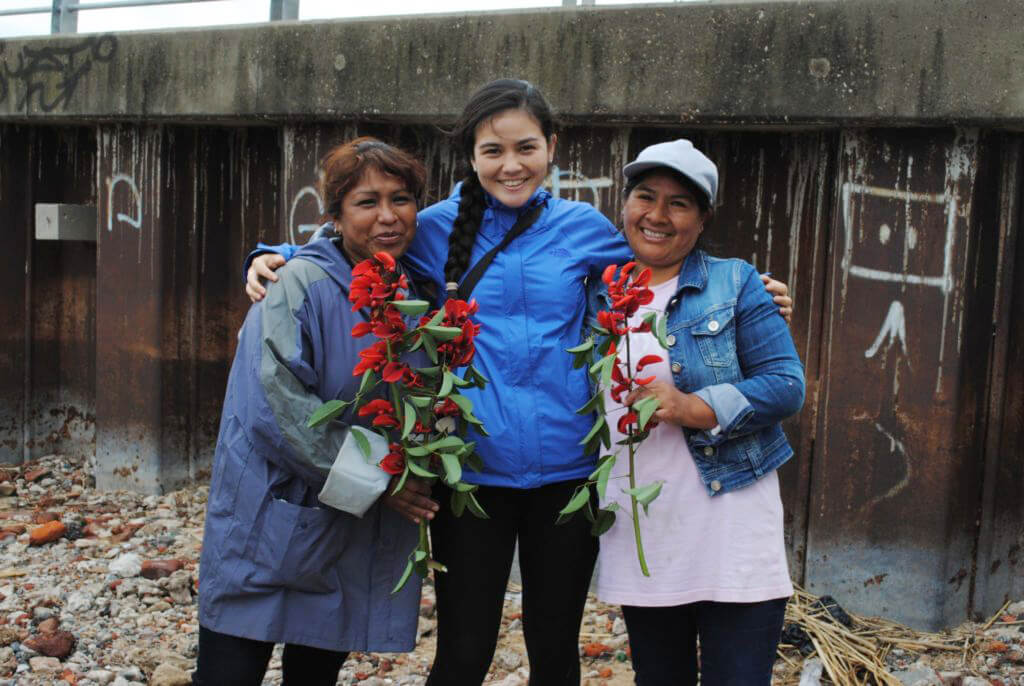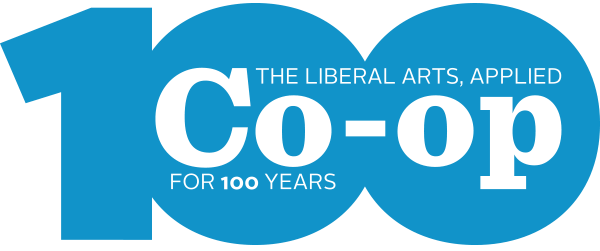Cooperative Education
Knowledge Applied in the Real World
Antioch College promotes meaningful engagement with the world through intentional linkages between campus-centered and field-based experiential learning.
For 100 years, a central component of Antioch’s education model has been its flagship Cooperative Education (Co-op) Program.
Lead an impactful life
By linking the life of the mind with professional engagement, Co-op animates a unique liberal arts curriculum that positions students to take action in a variety of diverse settings. Students have opportunities to engage with numerous partner organizations as they learn to navigate complex work environments, communicate publicly, and experiment with solution-oriented approaches to social change.
All Antioch students spend up to a third of their academic program—a minimum of three academic terms—engaged in the kinds of full-time work, research, or self-directed learning enterprises that have earned Antioch Co-op students an international reputation for creativity, industriousness, and ingenuity.
Co-op provides knowledge and knowhow which is why generations of Antiochians have had significant impacts in their communities and professions.
At the core of the Co-op experience is professional engagement—meaningful work in challenging settings where students generally can expect reasonable compensation for their contributions. Not only do Antioch students graduate with an outstanding education, an impressive resume, and compelling stories of Co-op adventure in distant locales, they gain exposure to innovative workplaces and discover their unique talents as they apply themselves to real problems in the world.

Real World Work Experience
Read student Co-op stories from Antioch Engaged: our journal of social practice & professional engagement
-
Serving the Community at Martin’s: Axel Slowe ’27 at Martin de Porres House of Hospitality in San Franciscoby Axel Slowe on May 19, 2024
Martin de Porres House of Hospitality, or Martin’s, is a free restaurant – essentially a soup kitchen that isn’t limited to just soup. You can find their website here: https://martindeporres.org/. Martin’s runs lunch from Monday to Saturday and has breakfast Tuesday through Friday. For the
-
“In the Bay, at Martins”: Bridget Padilla’24 at Martin de Porres in San Franciscoby 1 Co-op-Admin on February 22, 2024
What is Martins?Martin de Porres House of Hospitality, affectionately known as Martins, is a Free Restaurant, serving soup for anyone and everyone Monday – Saturday from 1-2pm. Martins was inspired by the catholic workers movement which lead to their mission to “serve in the spirit
-
Teaching Assistant at the Buen Dia Family School; Harris-Brewer ’25by Trinity Harris-Brewer on February 21, 2024
Working at Buen Dia has taught me the complexities of working as a teacher, childhood development, and the culture that San Francisco has to offer. When I first started working at Buen Dia I had some history of babysitting in my family, and while it
-
Learning to return to the land: Yuri Whitley ‘26 at the Antioch Farmby Yuri Whitley on June 15, 2023
The Antioch farm is a small-scale farm that works to provide farm-to-table produce for our community. Our primary goal is to be able to have enough produce to feed all of the students and staff on campus continuously. Growing up in a small town surrounded
-
Zootastic Life: Colin Ross ’26 at the Columbus Zoo and Aquarium in Columbus, Ohioby Colin Ross on May 31, 2023
Growing up, my family would constantly take trips to the zoo. I would walk around holding hands with my sister as we observed the animals. Through the years, the zoo became a part of my life, being my first class field trip, where I volunteered
-
Modeling Mosaics of Benthic Community Composition: Jones ’22 – NSF REU at the Bermuda Institute of Ocean Sciencesby Emma Sue Jones on October 7, 2022
Currently stationed at the Bermuda Institute of Ocean Sciences (BIOS Station) in St. George’s, Bermuda, I am on co-op fulfilling a position as a research assistant intern completing a “research experience for undergraduates”—also known as an REU—through the National Science Foundation. I am working under
“We have students working at foundations, nonprofits, successful businesses and companies and looking at what that feels like out in the world — being a part of a real team, making purposeful projects come to reality.”
— Luisa Bieri Rios,
Assist. Prof. of Cooperative Education
How it works
Field experience lies at the heart of cooperative education; however, developing a sense of inquiry, reflecting on lessons learned through experience, and engaging in dialogue on the ideas that emerge are essential components of the Co-op learning cycle. In order to meet the Co-op requirement necessary for graduation, all students are required to complete three approved field experiences and pass three Cooperative Education field courses (12 credits each) with a grade of C. Students enroll in these by registering for the appropriate Cooperative Education course that is offered at the time they engage in their Co-op term, as determined by fulfillment of both the co-requisite and any prerequisites identified. They thus are expected to earn a minimum of thirty-six Cooperative Education credits required for graduation.
Our voices carry around the world
Students have completed their Co-ops throughout the United States and in the following countries:
Argentina
Australia
Austria
The Bahamas
Belgium
Belize
Bolivia
Canada
Chile
Colombia
Costa Rica
Czech Republic
Denmark
Ecuador
Ethiopia
France
Germany
Ghana
Guatemala
India
Ireland
Israel
Italy
Japan
Mexico
Nepal
New Zealand
Nicaragua
Peru
Senegal
Spain
St. Vincent
Thailand
United Kingdom
Co-op News & Achievements
WE HAVE TO LEARN WAYS TO BOND AS A COMMUNITY: Interview with Angel Harris ’24
Interview by Matt Walker ‘04. MW: “Thank you for meeting with me. If you could say your name, where you're from, which class year you are in, and yeah, start with that.” AH: “Hi, my name is Angel Harris. I am a second-year. I'm the class of 2024. And I am...
Take a step back when you feel like you need to: An interview with Robyn McCoy ’24
“I’d probably tell people that it’s okay to worry about how you’re doing. But don’t put too much stress on yourself. Because when you put too much stress on yourself, that’s when you burn out and you feel like quitting. So just always take a step back when you feel like you need to take a step back.”
NOW WE CAN DO, BECAUSE WE ARE HERE: An interview with Rayy Graham ‘23
Interview by Matt Walker ‘04 MW: “So anyway, why don't you tell me about yourself? Tell me what your name is, where you're from…” RG: “I'm Rayy. Rayy Graham. I’m a Third Year, Class of 23. I’m from Brooklyn, New York. I came here initially because it's college....



